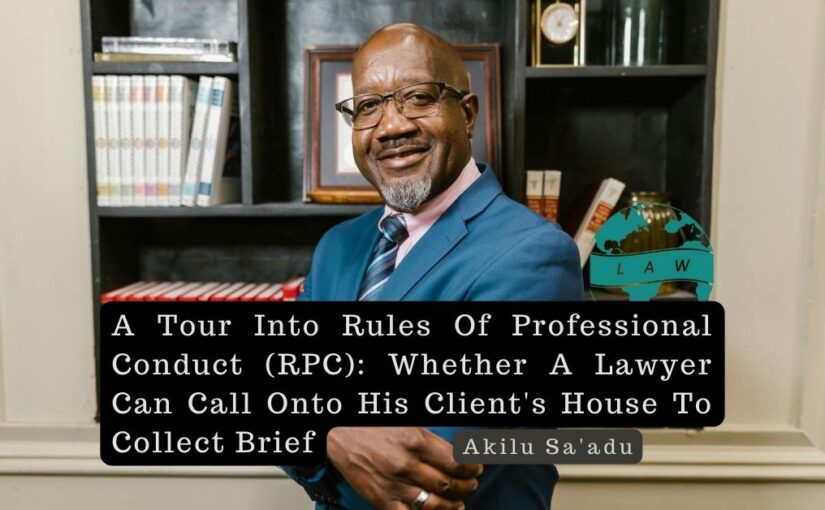A Tour Into Rules Of Professional Conduct (RPC): Whether A Lawyer Can Call Onto His Client’s House To Collect Brief
Every profession under the eyes of the sun has an ethics whose contravention amount to sin, sacrilege and desecration of the profession. However, there is no profession on earth which is embellished with ethical conducts like legal profession: Ethics and religious adherence to those ethical behaviours is what made legal profession unique.
Legal profession has an ancient history and has always been one of the most respected and cherished profession. Considering the trust and confidence reposed by society in lawyers, It is pertinent and sine-qua non for every lawyer or aspiring lawyer to imbibe the culture of obedience to the established legal code of conduct.
In the Nigerian legal parlance, the two corpus juris that govern the conducts and legal practice are: Rules of professional Conduct 2007 (therein referred as RPC) and Legal Practitioners Act. These legal codes regulate the conducts of lawyers ;and the entire legal profession in Nigeria.
Thus, the provision under these codes are very sacrosanct and saintly for the members of these envious profession to observe and act ethically and legally and any deviation, non-adherence, and disdainful treat of the provisions may amount to indiscipline , misconduct or infamous conduct as such, such person is ‘misfit to practice legal profession’. A lawyer must practice law not only within the wall of courtroom but in all his conducts.
The rational behind the regulation of lawyers’ conduct is not far-fetched; It is to safeguard the honour of legal practice, salvage the dignity of the long age-standing profession and reverence of the lawyers in our society.
The above encapsulation received a juridical affirmation and recognition in the case of 𝘼𝙗𝙪𝙖𝙝 𝙫 𝙇𝙚𝙜𝙖𝙡 𝙥𝙧𝙖𝙘𝙩𝙞𝙩𝙞𝙤𝙣𝙚𝙧𝙨 𝙘𝙤𝙢𝙢𝙞𝙩𝙩𝙚𝙚 (1962) 𝙉𝙎𝘾𝘾 175. per Ademola where it was observed that:
“Legal practitioners are officers of the court. It is our bound duty to see that officers of the court are men of integrity who could be trusted not only by the court but also by the public for whom they act”
subsequently, RPC and Legal practitioners Act come to effect in order to maintain the ethical conduct of the judicial officers.
According to the RPC there are many actions of legal practitioners which brings dishonour to the legal profession and which are termed as ‘infamous conduct’. However, the court defined infamous conduct by adopting the definition given in the English case which relates to medical and dental practitioners, that is the case of 𝙏𝙝𝙤𝙢𝙖𝙨 𝙍𝙞𝙘𝙝𝙖𝙧𝙙 𝘼𝙡𝙡𝙞𝙣𝙨𝙤𝙣 v. 𝙂𝙚𝙣𝙚𝙧𝙖𝙡 𝘾𝙤𝙪𝙣𝙘𝙞𝙡 𝙤𝙛 𝙈𝙚𝙙𝙞𝙘𝙖𝙡 𝙀𝙙𝙪𝙘𝙖𝙩𝙞𝙤𝙣 𝙖𝙣𝙙 𝙍𝙚𝙜𝙞𝙨𝙩𝙧𝙖𝙩𝙞𝙤𝙣 . The English Court of Appeal held in that case that, the infamous conduct mentioned in section 29 Medical Act must be conduct infamous per se;
that: infamous conduct can be regarded as a very serious infraction of acceptable standard of behaviour or ethics of a profession.”
Accordingly, breach of any of the Rules of Professional Conduct in the RPC could be held to constitute infamous conduct in a professional respect. (see the case of 𝙤𝙣𝙞𝙩𝙞𝙧𝙞 𝙫 𝙛𝙖𝙙𝙞𝙥𝙚 𝙘𝙝𝙖𝙧𝙜𝙚 𝙣𝙤 𝙇𝙋𝘿𝘾/𝙄𝙋/82 decided by LPDC in 1991) .
Thus, the visitation of a lawyer to his client’s business place or home in order to collect a brief or render any legal counselling is serious infraction of the provision of section 22 of RPC.
By the wordings of section 22 of RPC:
“A lawyer shall not call at a client’s house or place of business for the purpose of giving advice to, or taking instruments from, the client except in special circumstances or for some other urgent reason preventing his client from coming to his law office.”
The provision is very lucid and self-explanatory on the prohibition of lawyer to visit his client or to demand his job outside his chamber by his client. However, the RPC does not make it definite on the exigent situation where it is permissible for a lawyer to call onto his client’s workplace or home.
However, the ‘special circumstances’ that may warrant a lawyer to call onto his client’s house are:infirmity or illness of client or other reasons which may thwart a client from coming to the law office.
Where a legal practitioner is found wanton on this singular act, which is a contravention of the RPC provision, by section 55 of RPC, he shall be guilty of professional misconduct and will be liable to a punishments as provided by the Legal Practitioners Act.
Worthy of note is the provision of section 10 of Legal Practioners Act that, it is within the province of Legal practitioners Disciplinary Committee established under section 10 to invoke the wrath of law where it is alleged that a person whose name is on the roll has misbehaved in his capacity as a legal practitioner or should for any other reason be the subject of proceedings under this Act.
Conclusion
Looking at the sacredness of legal practice, we hope law officers will conduct themselves in line with their profession and practice which are govern by two most important codes: Rules of professional conduct and Legal practitioners Act.
About Author
Akilu Sa’adu is a 200 level law student from the faculty of law, Ahmadu Bello University Zaria. He is a human right advocate, an arbitration enthusiast, he has passion in maritime law, family law and corporate practice.



Leave a Reply